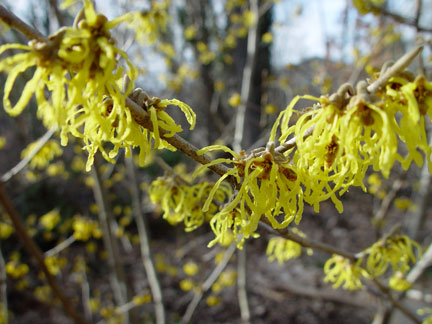Excerpt of Article posted in The Times of Northport
Artist cultivates her livelihood like a garden
By Arlene Gross
June 13, 2007 | 02:39 PM
Northport resident Mary Ahern is a successful artist who practices a unique technique she describes as. “Digital Mixed Media Painting”.

Mary Ahern enjoying her garden peonies.
But Ahern, who… (was) among the exhibitors at Arts in the Park in Northport July 8, (2007) was not born an artist. “I didn’t come to paint until I was older,” she said. “I didn’t even know I had a facility for it.”
As a young girl, she focused on music: playing trumpet and saxophone for the high school band and conducting her Fort Hamilton High School graduation in Brooklyn with a rousing rendition of Beethoven’s Fifth Symphony.
“I’ve been in the bleeding edge of those kinds of issues,” she said. “In those days, girls didn’t conduct.”
A life-changing moment came in her 20s, when a friend gave her a coffee table book of Georgia O’Keeffe’s paintings.
“I opened it up and turned the pages and wept,” she recalled. “It was completely transforming. I could only look at 10 pictures a day, it was so overwhelming.”
From that moment, Ahern knew she must study art and, then a resident of Queens, attended Queens College.
Although she was influenced by O’Keeffe and painted similar subjects, such as close-up and sensual florals, Ahern said she did not mimic her idol’s technique. Whereas O’Keeffe painted with direct and rapid strokes, Ahern’s traditional paintings were created in grisaille, or gray scale, and layered with washes of pigment on top, giving the subjects a glow through the optical blending of glazes of pigment.
After divorcing her first husband, Ahern took a job at Barnard College’s career counseling office, where she herself was able to get some career guidance. Through her Barnard position, she attended Columbia University for free by working there while raising sons, Chris and Michael, then ages 10 and 8.
“I knew if I couldn’t stay home and be a mom and paint, I had to make a decision: I’m going to make as much money as possible,” she said.
With profit in mind, Ahern went into technology sales, selling computer graphics and eventually becoming Northeast regional sales manager at Chyron Corporation in Melville. Then she started Online Design, a digital graphics company.
For Ahern, feminism was not a word to bandy about but, rather, her day-to-day reality – working as a single mother in a male-dominated industry.
“My single-minded focus on providing a good life for my sons enabled me to ignore the tremendous obstacles, prejudice, emotional assault and loneliness that comes from breaking through social barriers,” she said. “I, like my father, pulled myself up by my bootstraps. As a woman in a male industry however, I, like Ginger Rogers, did everything in high heels and backwards.”
In 1989, Ahern fulfilled her dream of buying a house with a spacious garden in Northport, which she said, “was like a step back in time to a slower and more gracious lifestyle.”
“The center of town with a Main Street embedded with trolley tracks leading to the harbor breezes and music in the gazebo captured my attention and insisted upon my attendance. I needed to move here.”
Eleven years later, she renovated her home, adding an airy, second floor art studio, and now natural light trickles throughout.
The garden, which Ahern designed, encircles the house, with its artfully designated focal points and meandering paths, everything flowing gracefully.
“I practice nonviolent gardening – no rose bushes to stab you – all soft inviting plants,” she said.
Seventeen years after her first marriage ended, Ahern married David Ruedeman, an engineer at Chyron. The couple worked together there but got to know one another only when he became a client of Online Design. This year will mark the couple’s 10th anniversary…
Early on in the second marriage, wishing to reinvent herself, Ahern got a degree in horticulture from SUNY Farmingdale in 2000, with the idea of becoming a landscape designer, which she did for a year. “It was too much for my … body,” she said, of the many hours spent working on bended knees.
From there, it was a two-year course studying botanical illustration at the New York Botanical Gardens in the Bronx.
Her (Mixed Media) painting, a culmination of expertise paralleling her life’s progressive journey, combines a passion for the fine arts, gardening, computer graphics and botanical painting.
“To be creative, you need to know your medium,” Ahern said of her computer graphics skills. Through her paintings, she seeks to make people look around them and become more aware of the nature surrounding us.
Dr. Roberta Koepfer, her friend since 1971, said, “She’s like a phoenix. I have seen her rise up from a fair number of devastating experiences. Every time she comes back, she comes back more dynamic, more focused on her art and with an increased zest for life and personal growth.”
When it came time to sell her art, Ahern’s business savvy came in handy; she started in Northport as an exhibitor at the annual Arts in the Park series (in 2004) and now participates in about 15 art shows in New York and Connecticut between May and September, with her husband lending a hand.
Ahern’s work has also been the focus of several gallery exhibitions, including a one-person show at Greenlawn’s Harborfields Library this past February.
Susan Hope, gallery coordinator for the library, noted that Ahern’s exhibit was well timed: her cheerful florals brightened the gloom of winter. “It has an eye catching appeal,” she said. “People really enjoyed it, whether they were art savvy or just seniors on their way to their meetings.”
Today, Ahern is either painting her botanicals, selling them or lecturing on the business of art at libraries or schools, although her business persona has changed radically over the years. “I did trade shows in high heels and silk suits,” she said, “now I’m doing business in Birkenstocks and shorts.”
To anyone seeking career guidance, Ahern advised, “Don’t throw away anything you’ve done because you want to transform yourself. Take the good portions, the positive elements and try to incorporate them into this new self you’re creating. That’s how I’m living my life.”




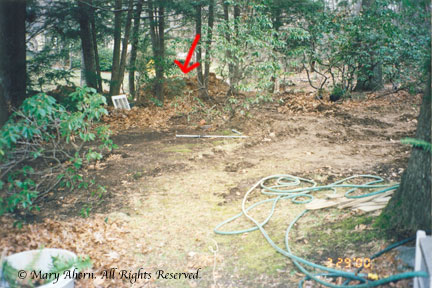


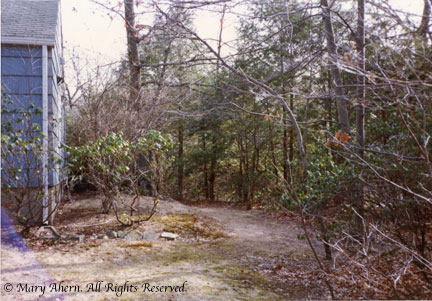







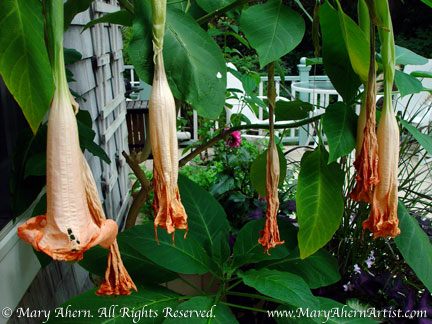

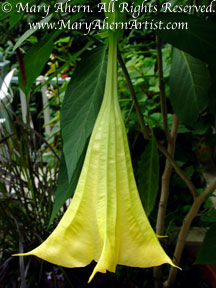


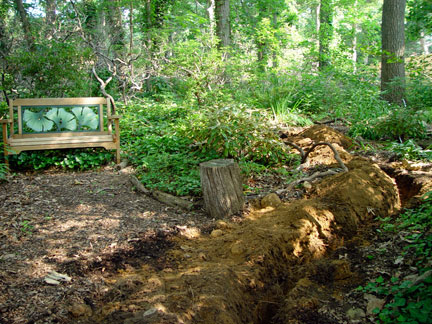
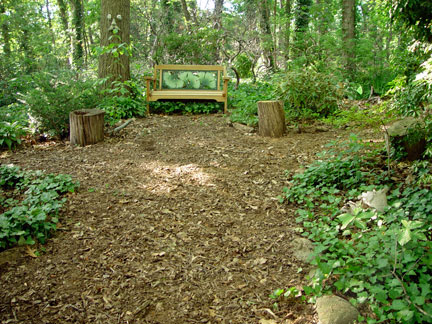
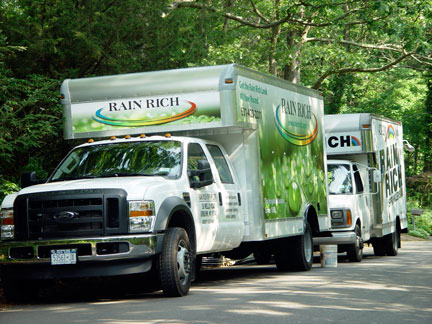
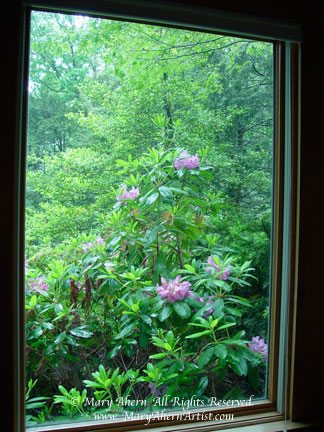
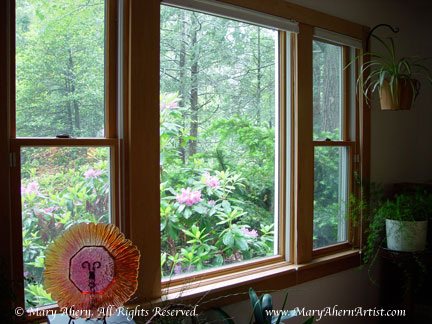

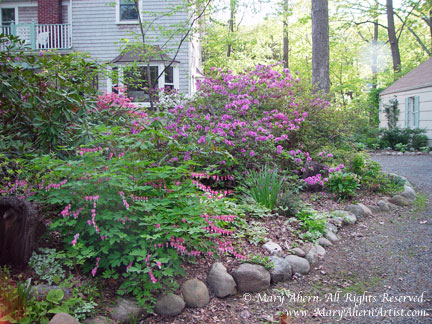

 Last year I took this picture in my front entry garden on April 14th. This is just at the edge of where the driveway meets the garden and as you can see, I hadn’t even finished clearing out the leaves from the miniature rhododendrons. The bulbs are all starting to come up and the azaleas behind the tree stumps are getting green. The Cercis canadensis ‘Covey’ or Eastern weeping redbud tree is not yet in bloom and I haven’t turned the water on at the little globe water feature. I haven’t even gotten around to planting the hayracks on the deck banisters.
Last year I took this picture in my front entry garden on April 14th. This is just at the edge of where the driveway meets the garden and as you can see, I hadn’t even finished clearing out the leaves from the miniature rhododendrons. The bulbs are all starting to come up and the azaleas behind the tree stumps are getting green. The Cercis canadensis ‘Covey’ or Eastern weeping redbud tree is not yet in bloom and I haven’t turned the water on at the little globe water feature. I haven’t even gotten around to planting the hayracks on the deck banisters.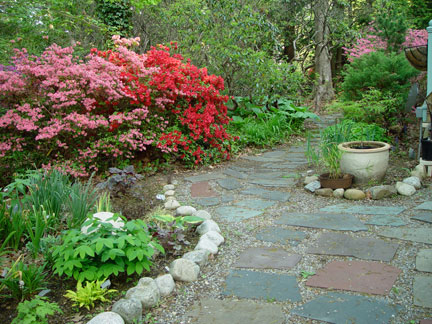 This second photo was taken a month later on May 17th and what a difference! The azaleas, which were here when I bought the property in 1989, are in bloom in the entry garden and in the distance in the front garden. The Uvularia grandiflora or Bellwort is spreading itself in front of my globe. A hosta named ‘Diana Remembered’ that I bought from
This second photo was taken a month later on May 17th and what a difference! The azaleas, which were here when I bought the property in 1989, are in bloom in the entry garden and in the distance in the front garden. The Uvularia grandiflora or Bellwort is spreading itself in front of my globe. A hosta named ‘Diana Remembered’ that I bought from 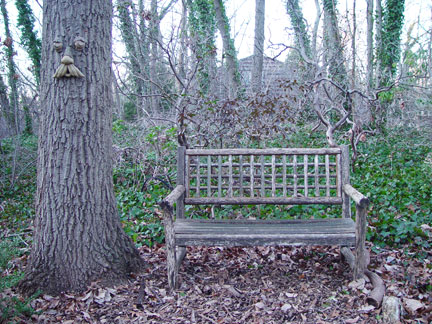 I don’t have much seating around my woodland walks other than tree stumps since it is a place for a meandering journey rather than a destination. But I do have one bench that allows me to sit and take a break if my phone rings while I’m gardening.
I don’t have much seating around my woodland walks other than tree stumps since it is a place for a meandering journey rather than a destination. But I do have one bench that allows me to sit and take a break if my phone rings while I’m gardening.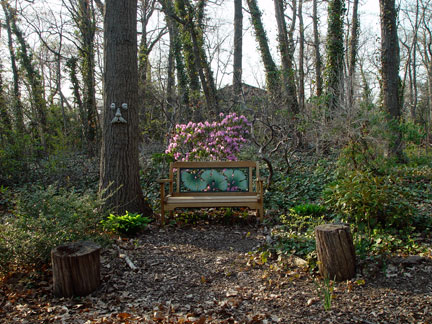 This next bench I bought in September of 2008 to celebrate my birthday. I found it on the web at
This next bench I bought in September of 2008 to celebrate my birthday. I found it on the web at  Here is a view from behind the bench looking towards my home. If you look closely you can see that I have secured the bench to the adjacent oak tree to prevent it from getting legs and walking out of the garden. Some years ago I found that my wood chipper had disappeared from the garden and it took me quite some time to get over the sense of violation and intrusion.
Here is a view from behind the bench looking towards my home. If you look closely you can see that I have secured the bench to the adjacent oak tree to prevent it from getting legs and walking out of the garden. Some years ago I found that my wood chipper had disappeared from the garden and it took me quite some time to get over the sense of violation and intrusion.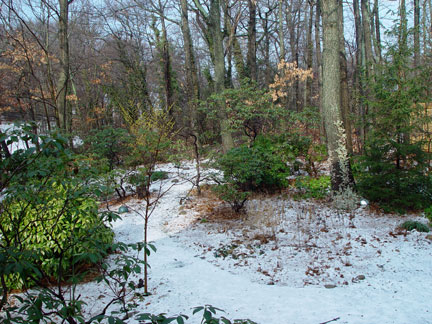 My witch hazel, otherwise known as Hamamelis x intermedia ‘Arnold Promise’, begins blooming in February in my neck of the woods. I’m located in zone 6, on Long Island, NY in the United States which is latitude 40.900N and longitude -73.343W. The elevation is listed as 59 feet but I’m at the top of a series of hills so I’m a bit higher up from the town harbor. This means that I get a little bit more snow than other parts of my town and it lasts longer.
My witch hazel, otherwise known as Hamamelis x intermedia ‘Arnold Promise’, begins blooming in February in my neck of the woods. I’m located in zone 6, on Long Island, NY in the United States which is latitude 40.900N and longitude -73.343W. The elevation is listed as 59 feet but I’m at the top of a series of hills so I’m a bit higher up from the town harbor. This means that I get a little bit more snow than other parts of my town and it lasts longer.